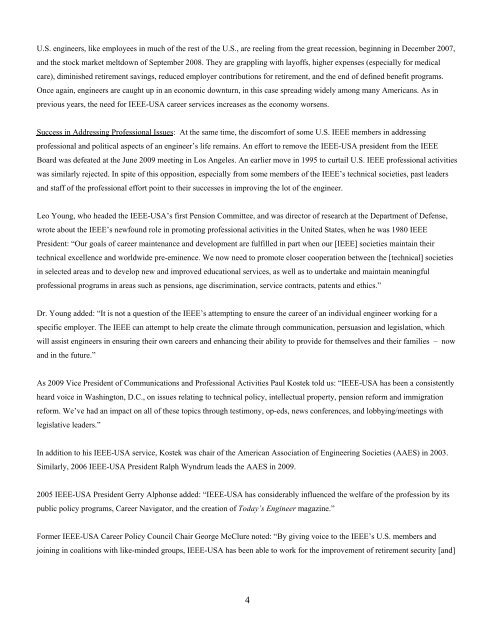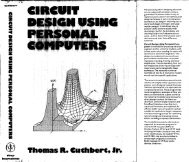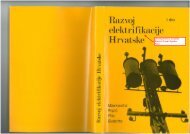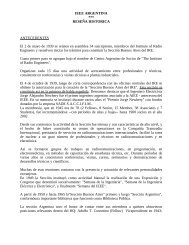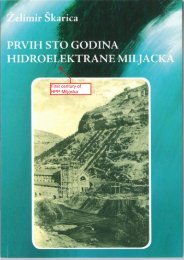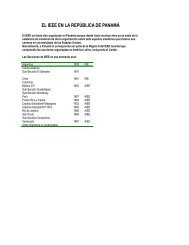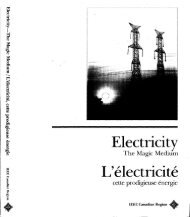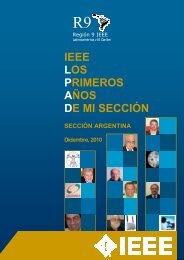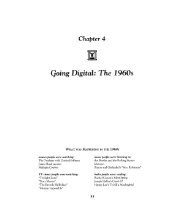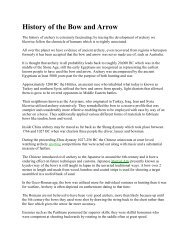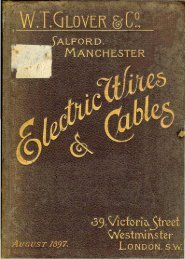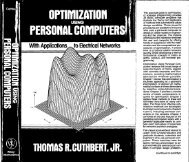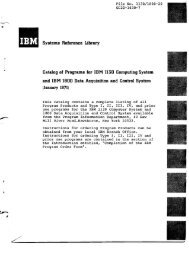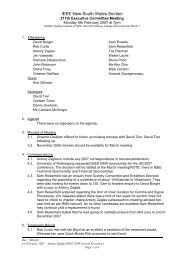History of IEEE-USA: 1973-2009 â An Overview of Four Decades ...
History of IEEE-USA: 1973-2009 â An Overview of Four Decades ...
History of IEEE-USA: 1973-2009 â An Overview of Four Decades ...
Create successful ePaper yourself
Turn your PDF publications into a flip-book with our unique Google optimized e-Paper software.
U.S. engineers, like employees in much <strong>of</strong> the rest <strong>of</strong> the U.S., are reeling from the great recession, beginning in December 2007,<br />
and the stock market meltdown <strong>of</strong> September 2008. They are grappling with lay<strong>of</strong>fs, higher expenses (especially for medical<br />
care), diminished retirement savings, reduced employer contributions for retirement, and the end <strong>of</strong> defined benefit programs.<br />
Once again, engineers are caught up in an economic downturn, in this case spreading widely among many Americans. As in<br />
previous years, the need for <strong>IEEE</strong>-<strong>USA</strong> career services increases as the economy worsens.<br />
Success in Addressing Pr<strong>of</strong>essional Issues: At the same time, the discomfort <strong>of</strong> some U.S. <strong>IEEE</strong> members in addressing<br />
pr<strong>of</strong>essional and political aspects <strong>of</strong> an engineer’s life remains. <strong>An</strong> effort to remove the <strong>IEEE</strong>-<strong>USA</strong> president from the <strong>IEEE</strong><br />
Board was defeated at the June <strong>2009</strong> meeting in Los <strong>An</strong>geles. <strong>An</strong> earlier move in 1995 to curtail U.S. <strong>IEEE</strong> pr<strong>of</strong>essional activities<br />
was similarly rejected. In spite <strong>of</strong> this opposition, especially from some members <strong>of</strong> the <strong>IEEE</strong>’s technical societies, past leaders<br />
and staff <strong>of</strong> the pr<strong>of</strong>essional effort point to their successes in improving the lot <strong>of</strong> the engineer.<br />
Leo Young, who headed the <strong>IEEE</strong>-<strong>USA</strong>’s first Pension Committee, and was director <strong>of</strong> research at the Department <strong>of</strong> Defense,<br />
wrote about the <strong>IEEE</strong>’s newfound role in promoting pr<strong>of</strong>essional activities in the United States, when he was 1980 <strong>IEEE</strong><br />
President: “Our goals <strong>of</strong> career maintenance and development are fulfilled in part when our [<strong>IEEE</strong>] societies maintain their<br />
technical excellence and worldwide pre-eminence. We now need to promote closer cooperation between the [technical] societies<br />
in selected areas and to develop new and improved educational services, as well as to undertake and maintain meaningful<br />
pr<strong>of</strong>essional programs in areas such as pensions, age discrimination, service contracts, patents and ethics.”<br />
Dr. Young added: “It is not a question <strong>of</strong> the <strong>IEEE</strong>’s attempting to ensure the career <strong>of</strong> an individual engineer working for a<br />
specific employer. The <strong>IEEE</strong> can attempt to help create the climate through communication, persuasion and legislation, which<br />
will assist engineers in ensuring their own careers and enhancing their ability to provide for themselves and their families – now<br />
and in the future.”<br />
As <strong>2009</strong> Vice President <strong>of</strong> Communications and Pr<strong>of</strong>essional Activities Paul Kostek told us: “<strong>IEEE</strong>-<strong>USA</strong> has been a consistently<br />
heard voice in Washington, D.C., on issues relating to technical policy, intellectual property, pension reform and immigration<br />
reform. We’ve had an impact on all <strong>of</strong> these topics through testimony, op-eds, news conferences, and lobbying/meetings with<br />
legislative leaders.”<br />
In addition to his <strong>IEEE</strong>-<strong>USA</strong> service, Kostek was chair <strong>of</strong> the American Association <strong>of</strong> Engineering Societies (AAES) in 2003.<br />
Similarly, 2006 <strong>IEEE</strong>-<strong>USA</strong> President Ralph Wyndrum leads the AAES in <strong>2009</strong>.<br />
2005 <strong>IEEE</strong>-<strong>USA</strong> President Gerry Alphonse added: “<strong>IEEE</strong>-<strong>USA</strong> has considerably influenced the welfare <strong>of</strong> the pr<strong>of</strong>ession by its<br />
public policy programs, Career Navigator, and the creation <strong>of</strong> Today’s Engineer magazine.”<br />
Former <strong>IEEE</strong>-<strong>USA</strong> Career Policy Council Chair George McClure noted: “By giving voice to the <strong>IEEE</strong>’s U.S. members and<br />
joining in coalitions with like-minded groups, <strong>IEEE</strong>-<strong>USA</strong> has been able to work for the improvement <strong>of</strong> retirement security [and]<br />
4


